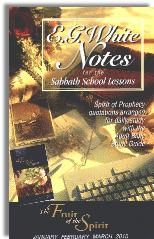|
||||||||||||||
Commentary on "The Fruit of the Spirit is Kindness"
Day 1: Sabbath Afternoon, January 30, 2010
Overview
The lesson for this week is about another fruit of the Spirit, kindness. In order to arrive at an accurate perspective and evaluation of the author’s treatment of this subject, it’s proper to look at the kindness in the context of the larger picture of what are the fruits of the Spirit.
Observations
The Bible doesn’t give us the luxury of a moralistic religion in which virtues are seen as achievements resulting from behavioral modification, exercise and hard work. The Bible pictures kindness not as a virtue that is developed by effort and sweat on the basis of human internal power activated by different stimuli, but it sees kindness as one part of the fruit of the Holy Spirit, and it is always accompanied by the rest of the fruit of the Spirit. By definition, a fruit is the product of a plant, and in our case the Holy Spirit is the producer, the cause of the fruit. In the final instance, we can’t take credit for being kind or loving or patient; all the credit must go to Somebody else, the Holy Spirit who works in us simultaneously what we afterwards manifest in our life. In our review of the current lesson, we will evaluate it keeping in mind the distinction between a moralistic religion which gives glory to man and his achievements and the faith to which Christ had called us which gives all glory to God, particularly, in our case, to the Holy Spirit.
In the Sabbath afternoon lesson, our author presents kindness as an active characteristic in contrast with patience, which he presents as passive, and he arrives at the conclusion that the motivation for our good works is their most important aspect. In this context, his statement “Kindness is not beyond the reach of any, although it may take the sacrifice of time and energy,” contradicts what he said about motivation being the most important aspect. It is true that kindness is not beyond the reach of anybody, including non-believers—people who are spiritually dead, unregenerate. Still, their kindness is not the product or the fruit of the Holy Spirit, and the motivation behind their kind deed is radically different from the motivation produced by the Holy Spirit. If the motivation is indeed the most important aspect of a deed, the kindness that is “not beyond the reach of any” lacks exactly what is essential. Somebody may wonder if the author of the study is going to deal with the true fruit of the Holy Spirit or with a religious/moralistic or even atheistic kindness that has nothing to do with the fruit of the Holy Spirit and with a regenerate person.
Summary
- The Bible does not allow us the luxury of a moralistic religion.
- Each fruit of the Spirit is accompanied by the whole complement; they cannot be separated because together they are the product of the Holy Spirit in our lives.
- Good works produced by a non-born-again person is not fruit of the Spirit.
- Motivation is the most important aspect of good works; any motivation that stems from personal determination is not stemming from the Holy Spirit.
- Fruit of the Spirit, including kindness and patience, is the direct result of His literal presence in a born-again person, not from a person’s noble impulses.
GO TO DAY 2
Copyright 2010 BibleStudiesForAdventists.com. All rights reserved. Revised January 27, 2010. This website is published by Life Assurance Ministries, Glendale, Arizona, USA, the publisher of Proclamation! Magazine. Contact email: BibleStudiesForAdventists@gmail.com.
The Sabbath School Bible Study Guide and the corresponding E.G. White Notes are published by Pacific Press Publishing Association, which is owned and operated by the Seventh-day Adventist church. The current quarter's editions are pictured above.
Official Adventist Resources
Standard Edition Study Guide Week 6
Teacher's Edition Study Guide Week 6
Easy Reading Edition Study Guide Week 6
Search the Complete Published Ellen G. White Writings


